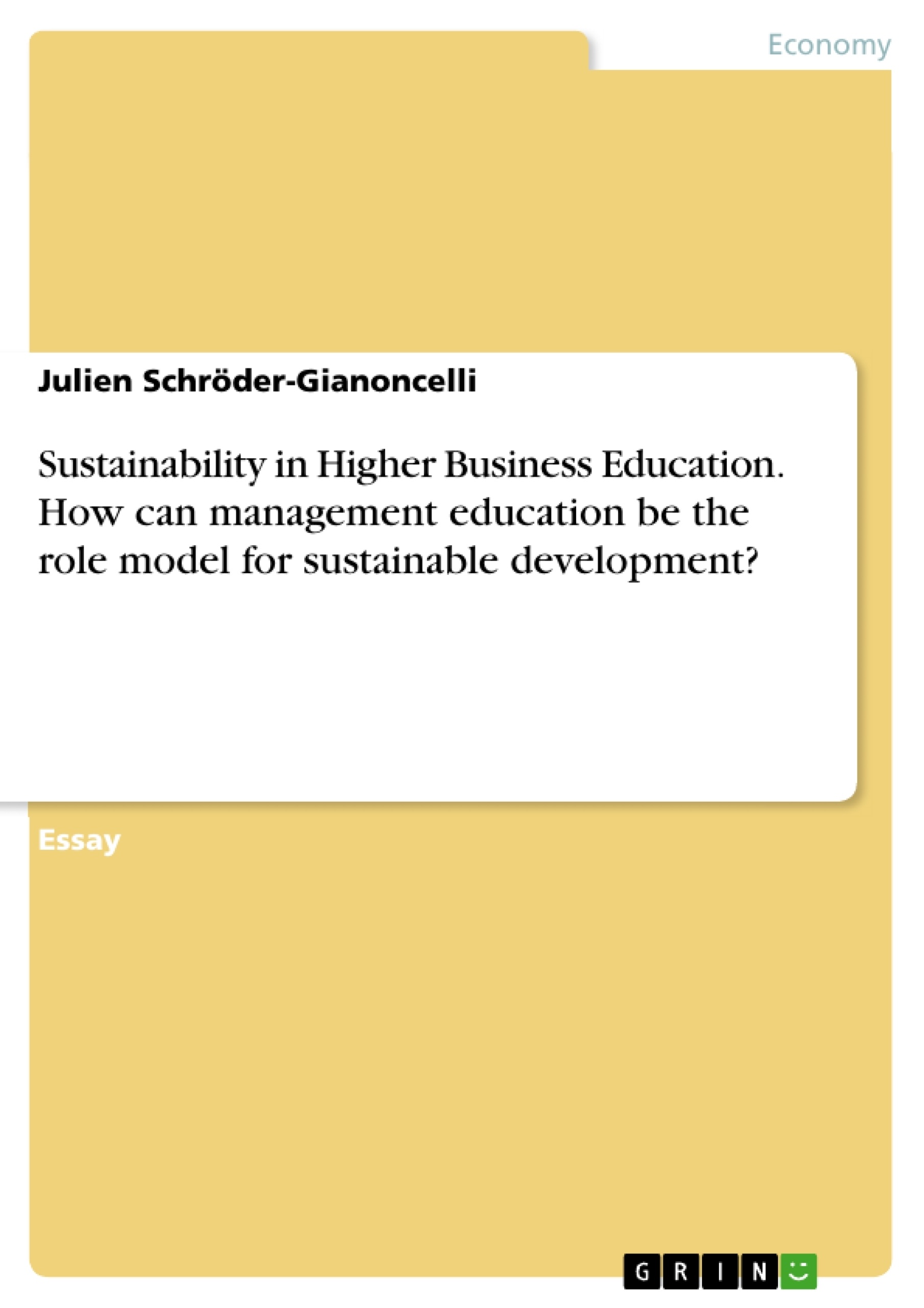The essay shall demonstrate how management schools can advance and are advancing to become a role model in the on-going sustainable development of society.
The material presented in this essay is relevant to management institutions and to anyone involved with sustainable development to reinforce the generally accepted positive effects of education. The closed formulation of the question should not neglect the appreciation for the wider issue, as sustainability is a crossover, multidisciplinary field. However, the limitation was set to management education as being a form of educating future leadership personalities with advanced power to decide and direct organisations and to higher education being close to the age at entry into the working environment.
In times, of severe social-ecological problems and as a consequence thereof widespread efforts to oppose these problems, it is necessary to identify how to generate an effective countermovement and build resilience to a wider spread of such issues. Whereas the 20th century was shaped by wars and suppression in many countries, and hence the initiation of a worldwide peace process, the 21st century, even though still in its beginnings, will be a race against the so called environmental tipping points and social unfairness. And still the society is confronted with problems that are almost impossible to solve. The rapid economic development through the liberalisation of markets has lead to crises in diverse areas.
“Globalisation today is not working for many of the world’s poor. It is not working for much of the environment. It is not working for the stability of the global economy.” (Stieglitz, 2002, p. 214)
Not only critics of the neoliberal globalisation demand a solidary, sustainable rethinking, a fair distribution of wealth is a fastidious challenge. To secure at least the base of living of hundreds of million people is crucial. But for the 384 million people living with less than $1,25 per day, it is an absolute necessity that a socially responsible and economical-ecological viable attitude towards them will occur in the companies and consumer markets of western countries. Hence, this needs to occur in between those people relishing their higher education now or in the near future.
Inhaltsverzeichnis (Table of Contents)
- 1 Introduction to the essay
- 1.1 Purpose of the essay
- 1.2 Context and relevance of the essay
- 1.3 Structure of the essay
- 2 Together what belongs together?
- 2.1 Sustainable development
- 2.2 Educational institutions as sources of production
- 2.3 Development of values through role modelling
- 3 Insights into a practical approach - EMS at Karlshochschule
- 4 Conclusions
Zielsetzung und Themenschwerpunkte (Objectives and Key Themes)
This essay aims to demonstrate how management schools can and are advancing to become role models in the ongoing sustainable development of society. It explores the crucial role of management education in fostering a sustainable future.
- The importance of sustainable development and its application to management education.
- The role of educational institutions in promoting sustainable practices and values.
- The development of sustainable values through role modeling.
- The practical implementation of sustainable development in management education.
- The impact of management education on shaping future leaders committed to sustainable development.
Zusammenfassung der Kapitel (Chapter Summaries)
The essay begins by outlining its purpose, context, and structure. It then delves into the concept of sustainable development, highlighting its relevance for management education. The essay emphasizes the role of educational institutions as sources of production and knowledge transfer, advocating for the development of values through role modeling. It further explores the practical implementation of sustainable development in management education, using the example of Karlshochschule International University.
Schlüsselwörter (Keywords)
Key themes and concepts explored in this essay include sustainable development, management education, educational institutions, role modeling, value development, practical implementation, and future leadership.
Frequently Asked Questions
How can management schools become role models for sustainable development?
By integrating sustainability into their curriculum, acting as sources of knowledge transfer, and demonstrating sustainable values through institutional role modeling.
Why is sustainability relevant for future leadership?
Future leaders will face environmental tipping points and social unfairness; therefore, they need a socially responsible and ecological-economic viable attitude to direct organizations.
What is the "EMS at Karlshochschule" mentioned in the essay?
It refers to a practical approach or Environmental Management System implemented at Karlshochschule International University as an example of sustainable management education.
What are the main challenges of globalization discussed here?
The essay notes that neoliberal globalization is often not working for the world’s poor, the environment, or the stability of the global economy, necessitating a solidary rethinking.
How does higher education impact the "base of living" for the poor?
Educating students in Western countries about social responsibility influences the consumer markets and company policies that affect hundreds of millions of people living in poverty.
- Quote paper
- Julien Schröder-Gianoncelli (Author), 2014, Sustainability in Higher Business Education. How can management education be the role model for sustainable development?, Munich, GRIN Verlag, https://www.grin.com/document/323966



